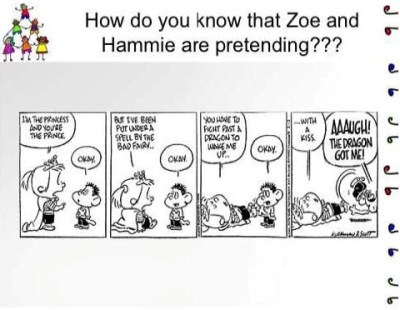Communication access realtime translation (cart) is provided in order to facilitate communication accessibility and may not be totally verbatim. The consumer should check with the moderator for any clarifications of the material.
>> Christa Tober: Good afternoon, everyone. Welcome to today's e‑Expert Seminar entitled, “Pretend I'm the Princess: Assessing and Treating the Language and Pretend Play” presented by Susan Hendler Lederer. Susan is an Associate Professor in the Department of Communication Sciences and Disorders at Adelphi University, Garden City in Long Island, New York. She is a New York State licensed and nationally certified speech‑language pathologist with 30 years of professional experience in the areas of language, literacy and pretend play development and disorders. Dr. Lederer has published and presented nationally on best practices in these areas. In addition, she is the author of three children's books designed to facilitate emerging language, literacy and pretend play. Welcome, Susan, and thank you so much for sharing your expertise with us today.
>> Dr. Lederer: Good afternoon, everyone, and thank you for sharing your lunchtime with me. If you have downloaded the handout, try not to look ahead so that when I ask you some questions you can sort of think about them before you see what I think the answer might be, because you may come up with an answer that's even better. So let's get started.
Today in the hour that we have, we plan to cover the following topics:
- We will define pretend play and all the aspects that constitute playing.
- We'll discuss the development of pretend play from its earliest years when the children are just pretending all by themselves, to the more sophisticated and elaborate periods in which they're pretending with other children. I call that collaborative pretend play.
- We'll talk about the developmental relationships between pretend play and areas such as language, literature, academics, social and emotional skills and then we'll talk about our kids.
- We'll talk about testing. But our focus is going to be on assessing the language of collaborative pretend play and we'll have a small case study, actually a practicum, where I'll give you some focus questions. We'll watch a five minute video and then we will see what conclusions we can derive about how well our children are playing
- And intervention, or what we can do to help advance their pretend play skills.
How do you know that Zoe and Hammie are pretending?
So if you're a fan of the comics here is my favorite.

This is Zoe and Hammie from Baby Blues and Zoe says, “I'm the Princess and you're the Prince.”
Hammie says, “Okay. But I've been put under a spell by the bad ferry.”
“Okay.”
“You have to fight past a dragon to wake me up…”
“Okay."
“…with a kiss.”
“Ahhhh! The dragon got me.”
So here is my question. How do you know that Zoe and Hammie are pretending? Take a minute and on your notes just write down a few, maybe two ways, that you can tell that they're pretending. And when you think you have a good answer, send me a note in the Q‑and‑A box.
Gionna says: “You be this. I'll be that.” So the idea of assigning roles is a very important component of identifying that a child is pretending. And she also says that there are props being used and we can see, for example, that beautiful towel cape and I'm sure a dime store tiara. Katherine says, “This is an imaginary scenario.” - which is true. This is the living room probably so it’s not actually a kingdom. Susan says, “She's not really a Princess.” I'll just do a few more. Dee Anne says that Hammie is reacting to the pretend dragon, which that's really cool. So the idea that sometimes the object is not even there is an excellent point. And Grett says something about acting out the story. So we see we have a sequence of events. Thanks to all the rest of you who have typed in your answers.

